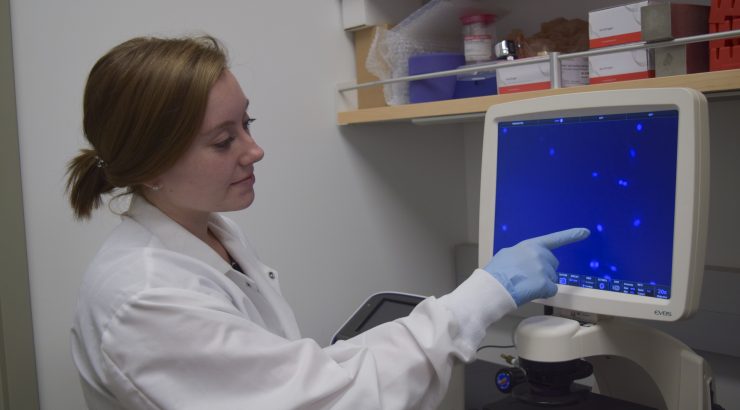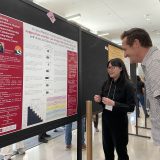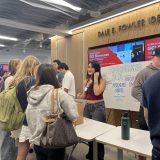How to Get Involved in Undergraduate Research
April 8, 2019
Are you interested in participating in undergraduate research, but don’t know where to start? Schmid College of Science and Technology has many opportunities for you to get research experience and work in collaboration with faculty to contribute your ideas.
What Types of Research Opportunities Are There?
From Dr. Jerry LaRue’s research that focuses on understanding the physics behind chemical reactions and what controls them, to Dr. Patricia Lopes’ research on what part of the brain makes one feel sick, you are likely to find a faculty member working on research in an area of your interest.
Dr. Gregory Goldsmith, his postdoctoral fellow Dr. Carter Berry, and their student researcher Alex Drivas ’21 spent this past summer researching plant ecophysiology to examine how climate impacts plant function. Most of their work is not in the lab, but in various parts of the world. The team just got back from a trip to the tropical rainforests of Costa Rica.
Many of our faculty are passionate about giving students the opportunity to gain hands-on experience in a lab. Dr. LaRue often has three to four individual projects going on, with around six to seven students on his research team assisting him. This allows students to get a sense of the different types of projects that are available in this field, further letting them experience hands-on research for themselves.
How To Find The Right Professor To Work With
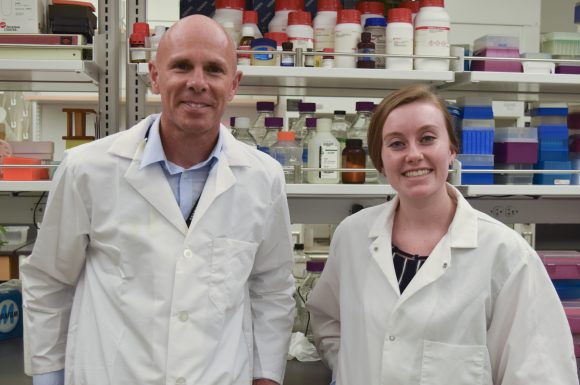
Dr. Marco Bisoffi with student researcher Emily Cauble
Biological sciences student Emily Cauble ’19, who assists Dr. Marco Bisoffi, said the process to find research opportunities she was interested in was easy. After shadowing surgical pathologists at a hospital, she simply looked up research at Chapman and then matched with Dr. Bissofi and the qualities he was seeking in a student researcher.
Getting a research position with a professor is quite simple. For Dr. LaRue’s team, all the students have to do is email him, and then have a short meeting with him where he will gauge the student’s seriousness about the project and then place them with a more senior member of the lab so they can begin learning from someone who has more experience. Once the student feels comfortable to begin more individualized work, they will start to receive projects of their own, said Dr. LaRue. However, Dr. LaRue will still meet with each student at least once or twice a week to review their progress and assist in any way.
What Qualities Are Faculty Looking For
When finding his six to seven student researchers that will be on his research team, Dr. LaRue looks for students who are “inquisitive, ask questions, and find problems that interest them.” He also wants prospective students to know that research at the university level is not like a lab class in high school.
At Chapman, in particular, you receive much more freedom and are able to delve deep into the areas that interest you most. Dr. Bisoffi explained that, when picking his research team, he looks for people who are “readily independent, go the extra mile because they are interested in the subject matter, and put in critical thinking.”
What It’s Like To Work On a Research Team
During a student’s first year, they are assigned projects and helped all the way through with as much as they need. Then, as they acquire new skills, they become more independent.
By senior year, Dr. Goldsmith said, students are able to design and execute projects independently. Alex Drivas ’21 is on Dr. Goldsmith’s research team and receives three credits for every nine hours he spends a week with the team. Drivas said that “research at the university level is much more hands-on than you think.” He says it is “different depending on the field, but it is not just about reading and writing. Rather, it is about building, doing experiments, and doing things you wouldn’t expect you could do.” He also explained how professors have no problem bringing students into their team who don’t have experience in the field. “As long as you are willing to ask questions,” he said, “the professors are always available to answer them.”
Cauble also stated that Dr. Bissofi is always there to help in any way he can. Every time they begin something new, she “shadows” him to learn before starting the project herself.
Dr. Lopes wants students interested in research to know that their research experience can be whatever they want it to be. They can be part of a lab where everyone works together, or they can come up with a project of their own. She explains, “During a student’s second semester, they can start to look for their own ideas by reading papers to come up with a project that really interests them.”
Brand New Facility, More Opportunities
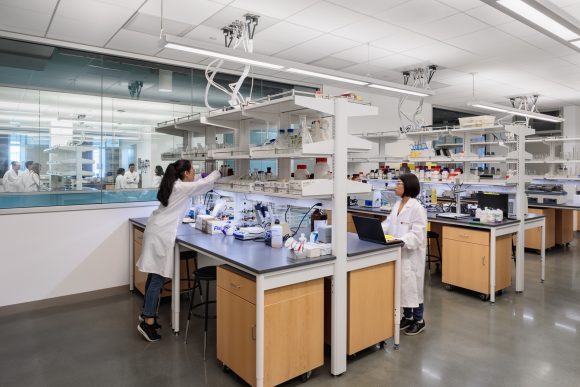
Keck Center for Science and Engineering Research Labs. Photo credit: A.C. Martin Architects
There is no better place to be when conducting research than the new Keck Center for Science and Engineering at Chapman. This building offers brand new research labs and is much more accommodating for larger research groups. “This newly built building is more collaborative,” said Dr. LaRue, “and all of the Chemistry faculty are now together which is very nice.”
With the move to the new Keck Center for Science and Engineering, Dr. Bissofi and Emily Cauble’s work can be done in a new and larger space where they have more available tools and room to conduct their research. They stated that it is “exciting to be in here” and they cannot wait to continue their work in this new space.
Overall, if you are looking to get involved in research at a university, Schmid College’s new research facility offers professors willing to help in any way and easily accessible opportunities for all.
Check out the list of Schmid College faculty and search by keyword to find a faculty member working in an area of your interest. I encourage you to send them an email and introduce yourself! As Dr. Lopes said, your research experience can be whatever you want it to be.
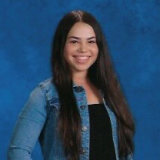 Briana Sukert is a current senior at Tarbut V’ Torah Community Day School who is interested in the medical field and doing research as an undergrad in college. She was invited by Founding Dean Andrew Lyon of the Fowler School of Engineering to write this piece to show prospective students what research is like at the university level, as well as learn personally what types of opportunities are available.
Briana Sukert is a current senior at Tarbut V’ Torah Community Day School who is interested in the medical field and doing research as an undergrad in college. She was invited by Founding Dean Andrew Lyon of the Fowler School of Engineering to write this piece to show prospective students what research is like at the university level, as well as learn personally what types of opportunities are available.
